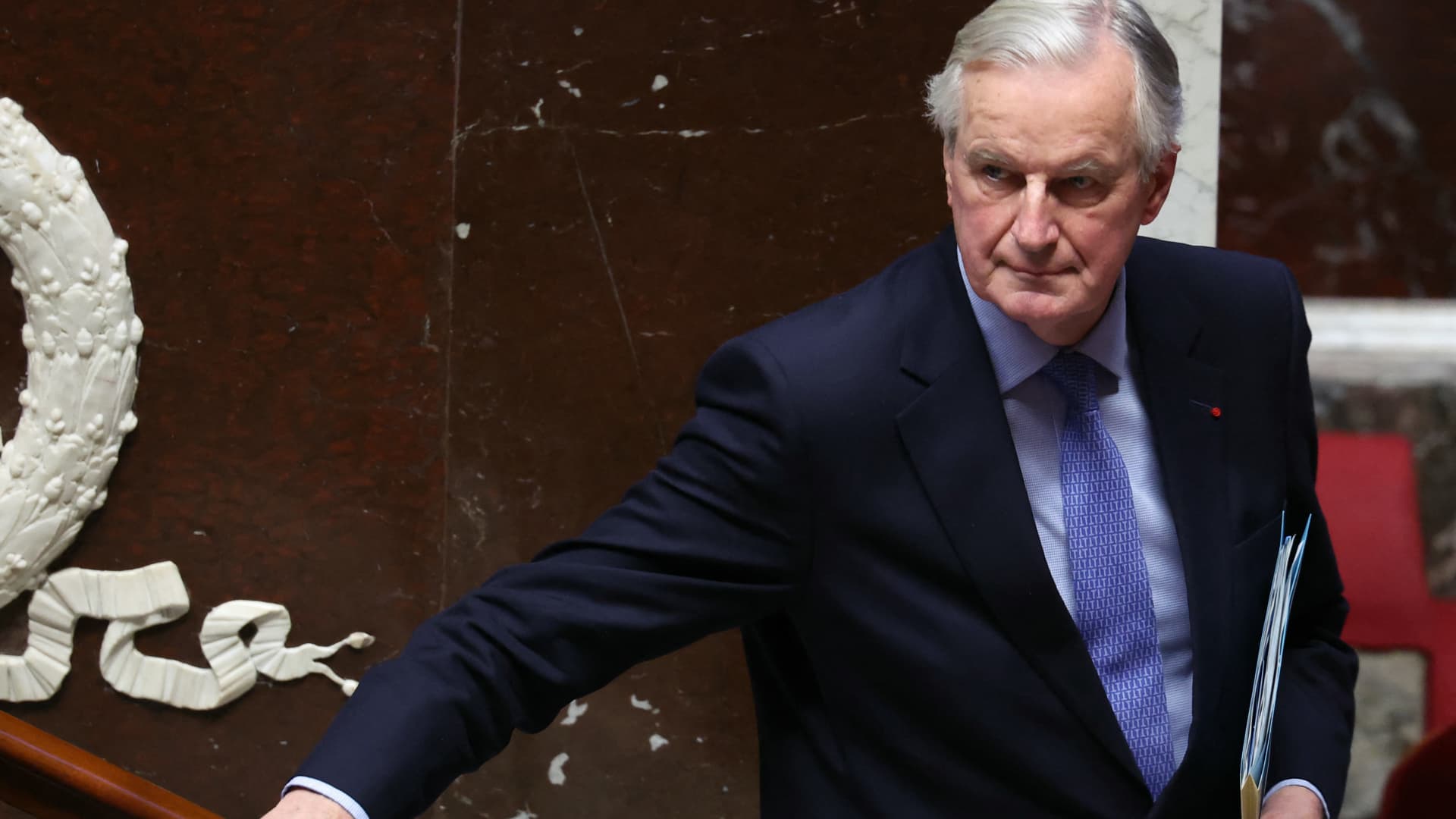France’s Prime Minister Michel Barnier (C) looks on during a session of questions to the government at The National Assembly in Paris, on December 3, 2024.
Julien De Rosa | Afp | Getty Images
The French government has been toppled in a vote of no confidence Wednesday, plunging the euro zone’s second-largest economy into a period of deep political uncertainty.
A total of 331 lawmakers from both the leftwing New Popular Front (NFP) alliance and the far-right National Rally (RN) supported a no-confidence motion in the country’s lower house, far exceeding the 288 votes needed to pass the motion.
Motions had been tabled by both the left and rightwing blocs on Monday after Prime Minister Michel Barnier used special constitutional powers to force a social security budget bill through Parliament without a vote.
National Rally had said it would vote for both its own “motion de censure” against the government, as well as lending its support to the NFP’s motion.
Either motion needed the support of at least 288 deputies, out of 574 deputies in the National Assembly, to see the no-confidence vote succeed. Combined, the far-right bloc and leftwing alliance have roughly 333 lawmakers in Parliament, although some lawmakers had been expected to abstain from the vote.
During a debate ahead of the vote, Barnier told lawmakers he was “not afraid” of being voted out but called on parties to work together and to “go above the general interest” to overcome divisions. He said it had “been an honor” to serve as prime minister, before receiving a standing ovation from French politicians.
Losing the confidence vote means Barnier will be forced to tender his resignation to French President Emmanuel Macron just three months after he was installed as premier on Sept. 5; Barnier’s administration will be the shortest-lived in France’s Fifth Republic, which began in 1958.
The prime minister’s downfall comes after several weeks of negotiations with opposition parties to try to find agreement over just one part of the wider 2025 budget, which included 60 billion euros ($63 billion) worth of spending cuts and tax hikes seen as necessary to tame France’s budget deficit which is expected to stand at 6.1% in 2024.
In the end, however, Barnier’s minority government failed to win over opponents on either side of the political spectrum. It faced the prospect of more haggling over the broader budget that had to be passed by Dec. 21, and was vulnerable to the whims of the National Rally, which had tacitly agreed to support the government until spending disagreements came to a head earlier this week.
The appointment of Barnier — a right-leaning conservative with Les Républicains party — was controversial from the off in September as it came after the RN and NFP won respective rounds of a parliamentary election held in June and July.
On Wednesday, the ideologically-distant blocs’ shared antipathy toward Barnier, the government and its budget plans brought them together, in what some analysts described as an “unholy alliance” of political foes.
What happens next?
Barnier is expected to resign immediately although Macron is likely to ask him to continue as a caretaker prime minister while he searches for a replacement. New parliamentary elections cannot take place until next June-July, 12 months on from the last vote.
As for the budget, the fall of Barnier and the government means that “all their unfinished legislative business falls with them,” according to Mujtaba Rahman, managing director of Europe at Eurasia Group.
An emergency budget is likely be passed within the month, effectively rolling over 2024 tax legislation until a 2025 budget is agreed, Rahman said in emailed comments Monday. But time is of the essence to appoint a new prime minister, as a 2025 budget cannot be passed by a caretaker government. That puts pressure on Macron to select a new prime minister quickly.
Government formation will be watched closely, according to Carsten Nickel, deputy director of research at risk consultancy Teneo, “including the degree of Macron’s personal involvement in the process.” Nickel warned that Barnier’s caretaker status could drag on, as new elections are not possible before the summer.
Barnier’s fate will be a strong warning to whoever Macron picks as his next prime minister as to the hazards and tripwires he or she will face when trying to reach a consensus over the budget, and other major policy decisions, given deep divisions in French politics laid bare since Macron’s ill-judged decision to call snap elections earlier this year.
France’s President Emmanuel Macron exits a polling booth, adorned with curtains displaying the colors of the flag of France, to vote in the second round of France’s legislative election at a polling station in Le Touquet, northern France on July 7, 2024.
Mohammed Badra | Afp | Getty Images
Macron returned from a three-day state visit to Saudi Arabia Wednesday evening, having kept a low profile in recent weeks amid the ongoing political turmoil engulfing the government — turmoil that ultimately resulted from his own decision-making. Now, Macron will face pressure over his appointment of a new prime minister, and over his own position.
“Macron can appoint any Prime Minister that he chooses to replace Barnier — including Barnier himself,” Rahman said, but France’s Parliament can also “censure his new choice whenever it wants to,” Rahman added.
“But both Macron and the much-divided parliamentary majority which opposes him have to calculate their strategy carefully,” Rahman said.
“The left and the far right must … be cautious. If they censure the new PM, there will be no legal authority to propose a rolled-over, stopgap budget. Government could, in theory, close on 1 January if there is no legal basis to raise taxes to pay for pensions or police or health care or defence — or [National] Assembly deputies’ salaries,” he noted.
In the meantime, the president is likely to face demands from the left and right that he resign in order for a new presidential election to be held far earlier than the one slated for 2027.
Resignation by Macron would trigger presidential elections within 35 days, analyst Carsten Nickel noted, adding that “while this seems unlikely, the snap polls earlier this year should at least serve as a reminder of Macron’s penchant for lonely decisions.”
Macron will likely ignore all pressure to resign, according to Eurasia Group’s Mujtaba Rahman, but “the new crisis puts him at the centre of the political game once again.”





